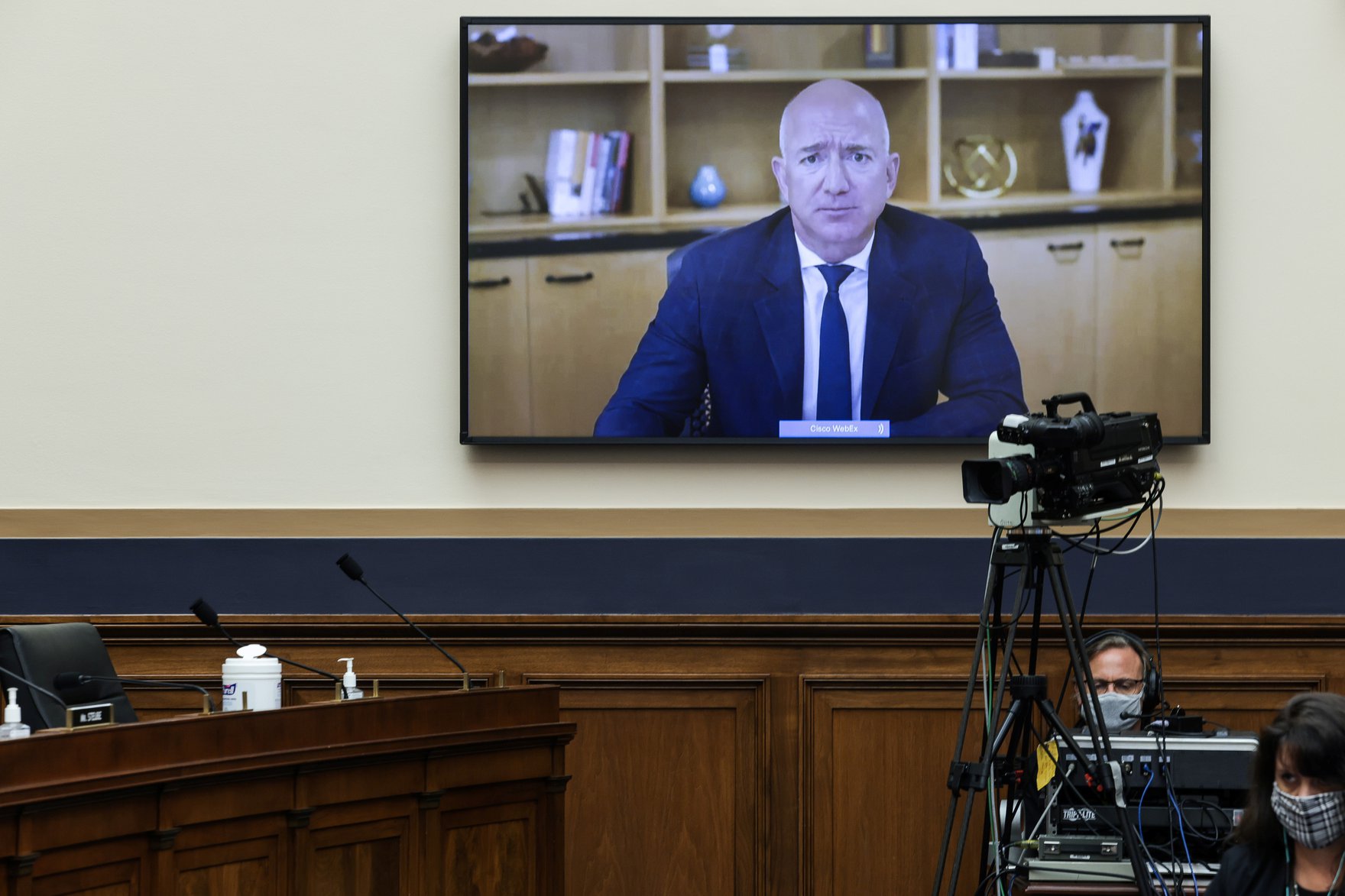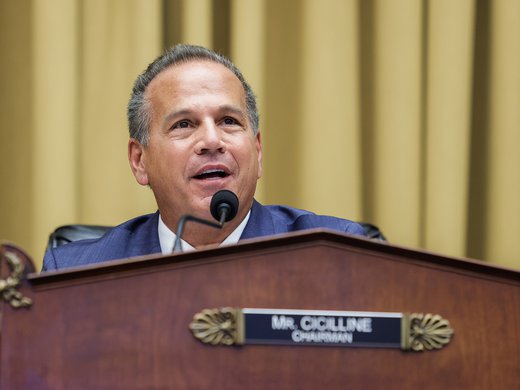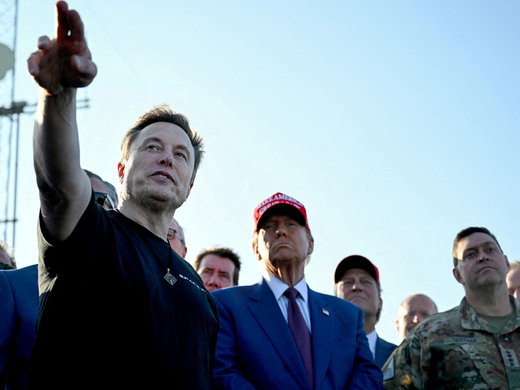A handful of technology giants have dominated the digital environment for years. But today, platform users and policy makers alike are living in a radically different environment.
The COVID-19 pandemic has reinforced the idea that the internet is essential infrastructure, and brought increased attention (and profits) to the big technology companies that dominate digital environments.
The July 29 antitrust hearings in Washington, DC, displayed not only a change of tone among lawmakers, but also a newfound confidence and competence.
Previously, when tech executives such as Mark Zuckerberg testified before Congress, the questions were soft, drawing laughs as they were delivered by lawmakers with seemingly no clue how the internet or digital platforms work.
This time was different. The committee hired antitrust researcher Lina Khan to bring deep knowledge and challenging questions to the table; Washington had been sorely lacking in its understanding of big tech.
However, it’s not just the added expertise that made a difference. Platform users and policy makers alike are living in a radically different environment now (induced, of course, by a pandemic), one that has increased the role and prominence of big tech in people’s lives and devastated the economy.
The COVID-19 pandemic has reinforced the idea that the internet is essential infrastructure, and brought increased attention (and profits) to the big technology companies that dominate digital environments.
Add to this the looming of what will be a factious and hotly contested presidential election and the conditions were set for a perfect storm of politics, money and monopoly, providing a focal point for what has already been a tumultuous year.
As US House Antitrust, Commercial, and Administrative Law Subcommittee Chairman David Cicilline said in his opening remarks: “Because concentrated economic power also leads to concentrated political power, this investigation also goes to the heart of whether we, as a people, govern ourselves, or whether we let ourselves be governed by private monopolies. American democracy has always been at war against monopoly power. Throughout our history, we have recognized that concentrated markets and concentrated political control are incompatible with democratic ideals.”
The hearing itself lasted upward of five hours and covered a broad range of topics, not all of which were directly related to antitrust.
The primary focus was largely on competitive issues, fuelled by growing research and evidence of the impact that big technology companies (namely, Amazon, Apple, Facebook and Google, whose executives testified at the hearings) have on competition and the marketplace as a whole.
For example, there was considerable focus on Amazon’s practices, and in particular its relationship with competitors and partners on the platform. The participants raised the findings of a Wall Street Journal investigation that detailed how Amazon would feign investing in a start-up only to then launch competing products. Concerns were also raised about the advantage Amazon reaps from data when it comes to recognizing the trending products or services on its platform, providing it with the ability to offer its own private-label products in response. Attention was also given to how Amazon steadily increases the fees for third-party merchants who depend upon the platform to conduct their own businesses.
Similarly, Apple’s commission structure was scrutinized during the hearing, as Apple takes up to 30 percent of the revenue generated from apps sold in its App Store and used on its mobile devices. This kind of gatekeeping is partly why critics suggest we’re in a rentier economy, where a few monopolies control access and extract unnecessarily high rents or, in this case, commissions. Apple was also questioned as to whether it gives preferential treatment to large companies such as Amazon.
The issue of preferential treatment was also raised with Google, in response to an investigation by the non-profit newsroom The Markup that showed 41 percent of the first page of Google search results point to Google products. This kind of product placement gives the search engine a huge advantage.
However, the real significance of Google’s search monopoly is its dominance of the online advertising market. This also received some attention in the hearing, notably in the context of local news and media industries. Google’s dominance in online advertising is partly a result of acquisitions by the search engine, and it is this ability of big tech to buy up its competition and any potential threats that has lawmakers especially concerned.
For example, Facebook’s purchase of Instagram was revisited in the hearings, as emails emerged that depict a plan at the social network to neutralize potential competitors. While Mark Zuckerberg did his usual dodge and weave, arguing that the company continues to face competition in all areas of its business, lawmakers did seem to land a number of tough questions that illustrate the ongoing threat that the technology giants pose to a competitive marketplace.
In addition to these antitrust concerns, lawmakers — in particular, Republican members of the committee — focused their remarks and questions on political bias, and whether these digital platforms would use their power to sway the upcoming US elections. While not directly relevant to antitrust policy, these concerns do demonstrate a growing awareness of the power that digital monopolies have and the potential political influence they wield.
There was, however, very little talk about remedies, with no discussion on breaking up big tech companies (for example, splitting Instagram from Facebook).
While the committee hopes to publish by September a final report that will include proposals to update antitrust laws and potential rules for big tech, these recommendations will come at a time when Washington is heavily divided and partisan. Similarly, with elections scheduled for early November, any new laws will have to wait until after the dust settles from what is certain to be a conflict-ridden election. There are, however, two major federal investigations currently under way, and the recent antitrust hearings could play a role in their outcomes.
One investigation is led by the Federal Trade Commission (FTC) and is largely focused on Facebook. While the investigation was slated to be completed before the election, it no longer looks that way; it, too, will be impacted by the outcome of the presidential election in November.
The FTC had been considering an injunction against Facebook, who had accelerated its plans to fully integrate Instagram and WhatsApp into the primary Facebook platform, in anticipation of potential orders to break the company up.
The FTC is also casting a wide net, examining past acquisitions over the past decade by the big five US tech companies (which include, in addition to the four companies that testified in July, Microsoft). This work may further energize efforts to break up big tech or, at least, limit further acquisitions.
Meanwhile, the US Justice Department is engaged in its own investigation of Google, with Attorney General William Barr taking a close interest in its progress. This demonstrates the political dynamic behind these investigations, with the White House in general claiming a desire to rein in big tech, or at least be perceived as doing so. As well, there is a widespread belief among US conservatives that social media companies are biased against them. While its current focus may be on banning TikTok (and therefore appear to be standing up to China), the Trump administration’s desire to stand up to the digital monopolies is in equal parts bold and erratic.
The irony is that the day after the antitrust hearings, these same companies announced record-breaking revenues and dramatic increases in their share prices — an illustration of both their power and the market’s belief that it will not be curbed any time soon.
There was a time when the issue of what to do about big tech seemed isolated, obscure and disconnected from the popular discourse. In no small part due to the pandemic, that has changed, and now the issue of what to do with these powerful companies is front and centre, and poised to play a significant role in the upcoming US elections.



